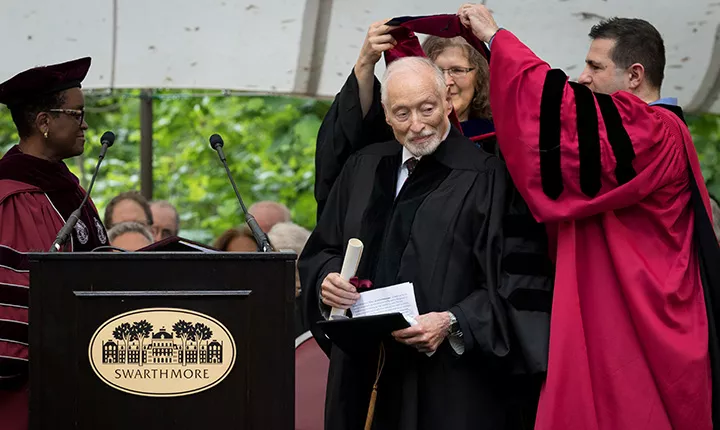President Valerie Smith's Charge to Edgar Cahn '56

Lawyer, writer, and social entrepreneur, Edgar Cahn, a member of Swarthmore College’s Class of 1956, is first and foremost a social justice advocate. Throughout his career, he has used the law to address poverty, racism, injustice, and inequality.
A graduate of Yale Law School, Edgar began his career in government as special counsel and speechwriter for then-Attorney General Robert Kennedy. In 1968, he founded the Citizens Advocate Center, an organization that worked on behalf of the rights of indigenous communities. With his late wife, Jean Camper Kahn ‘57, he later founded the Antioch School of Law, a visionary institution whose lawyer-teachers and student-advocates provided pro-bono legal services to those unable to obtain representation. Edgar also created Time Dollars, a local, tax-exempt currency designed to reward the efforts of those who seek to rebuild their communities and fight injustice.
Edgar Cahn has represented the highest and best values of his alma mater, pursuing justice, fairness, and equity in the service of the common good.
Edgar, upon the recommendation of the faculty, and by the power vested in me by the Board of Managers of Swarthmore College and the Commonwealth of Pennsylvania, I have the honor to bestow upon you the degree of Doctor of Laws
For more than 50 years, Edgar Cahn ’56 has worked to advance social justice, creating initiatives to address poverty, racism, injustice, and inequality.
After graduating from Swarthmore, Cahn married Jean Camper ’57, an African-American activist whom he met at the College. Working first as a speechwriter and counsel for Attorney General Robert Kennedy and as special assistant to Sargent Shriver, Edgar joined Jean in creating the National Legal Services program. Shriver credited the Cahns’ Yale Law Journal article “The War on Poverty: A Civilian Perspective” as the “genesis of legal services.” They are regarded as the founders of the field of poverty law.
In 1968, Cahn founded the Citizens Advocate Center as a government watchdog. In documenting the ongoing colonialism and exploitation of Native Americans, Cahn authored Our Brother’s Keeper: The Indian in White America. He also worked with leading Native American activists to initiate a campaign that led to official recognition of tribal governments and adoption of tribal self-determination as national policy.
Subsequently, Cahn spearheaded the first national campaign against hunger and malnutrition, authoring the report “Hunger USA” for a national board of inquiry. He simultaneously initiated litigation challenging the racially biased administration of the food stamp and commodities program that established the legal standing of recipients to bring suit. Related work led to legislation mandating shipments of food to severely malnourished communities in the South and on Indian reservations.
In 1972, the Cahns founded the Antioch School of Law, which reconceptualized legal education by utilizing as a central pedagogical vehicle a teaching law firm serving real clients. Attacked by academics at the time as anti-intellectual, the experiential program pioneered by Antioch is now an accreditation requirement for all law schools.
Designated by an act of Congress as the public law school of the nation’s capital, Antioch is now the David A. Clarke School of Law at the University of the District of Columbia, where Cahn serves as Distinguished Professor of Law. In addition to teaching Law & Justice to first-year students, he oversees their required 40 hours of community service and teaches System Change to faculty fellows in the school’s LL.M. program.
In 1980, Cahn began developing a unique tax-exempt currency, Time Dollars, to promote community building and empower residents. Use of this medium—undergirded by a web-based information system—has spread worldwide, renewing communities; providing a vehicle to bridge divides of race, class, gender, and national origin; and generating millions of hours of exchange. This hands-on work was coupled with development at the London School of Economics of a theoretical framework, “co-production,” which transforms clients from passive consumers of services to active co-producers of outcomes. Bridging theory and practice, Cahn was also instrumental in founding the Time Dollar Youth Court, the National Homecomers Academy, Cross-Age Peer Tutoring, and Carebank; his book No More Throw-Away People documents and chronicles those efforts.
A Fulbright Scholar and Ashoka Fellow, Cahn, who graduated from Swarthmore with a B.A. in English literature, earned a literature M.A. and Ph.D. and a J.D. from Yale University. In 2011, the Pennsylvania Bar Association and Swarthmore College began sponsoring an annual award named for the Cahns—given to a Swarthmore student for commitment to social justice and work in the youth court.



